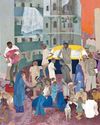
My father, a student in Calcutta in the late 1960s, once went to a post office in the city. He was surviving on a meagre scholarship without the support of his parents, a father who had disowned him—temporarily—for leaving his village on the Indo-Bangladesh border in the hope of an education that would give him a life different from the one his refugee parents had had. He had something important to communicate to them in faraway Hili, and, unsure about how long it would take a postcard or inland letter to reach them, he decided to send them a telegram. It was the third week of the month, and, having spent his savings on buying a ticket for an East Bengal–Mohun Bagan football match, he had only a few rupees for the rest of the month. When he found out the cost of sending the telegram, he apologized to the man at the counter about his inability to send the telegram, saying that he would write a letter to his parents instead. This is how my father remembers this conversation from five decades ago, the hurt and humiliation still fresh.
“Why did you waste my time when you can’t send the telegram?”
“Sir, I don’t have the money, I didn’t realize that it costs this amount of money . . . ”
“This amount? It’s very little.” “It’s not little for a student like me, sir. I’ll send them a letter . . . ” “A letter? Why do poor people have to write letters? And why do poor and illiterate people in the provinces have to receive letters from their children?”
And later—“Why do the poor have to write, why do they have to waste their money on pen and paper and writing?”
This story is from the {{IssueName}} edition of {{MagazineName}}.
Start your 7-day Magzter GOLD free trial to access thousands of curated premium stories, and 9,000+ magazines and newspapers.
Already a subscriber ? Sign In
This story is from the {{IssueName}} edition of {{MagazineName}}.
Start your 7-day Magzter GOLD free trial to access thousands of curated premium stories, and 9,000+ magazines and newspapers.
Already a subscriber? Sign In

BOOKS
Books review

STUDIO - Off Lamington Road by Gieve Patel
Oil on Canvas, 54 x 88 in

NEWS FROM THE WORLD OF MEDICINE
FOODS THAT FIGHT DEMENTIA

TO HELL AND BACK
The Darvaza crater in Turkmenistan is known as the Gates of Hell. I stood on its edge - and lived to tell the tale

THE SNAKE CHARMERS
Invasive Burmese pythons are squeezing the life out of Florida's vast Everglades. An unlikely sisterhood is taking them on

Sisterhood to Last a Lifetime
These college pals teach a master class in how to maintain a friendship for 50-plus years

...TO DIE ON A HOCKEY RINK
ONE MINUTE I WAS PLAYING IN MY BEER LEAGUE, THE NEXT I WAS IN THE HOSPITAL

Just Sit Tight
Broken, battered and trapped in a ravine for days, I desperate driver wonders, \"Will anyone find me?\"

Allow Me to Mansplain...
If there's one thing we know, it's this: We're a nation of know-it-alls

THE BITTER TRUTH ABOUT SUGAR (AND SUGAR SUBSTITUTES!)
It's no secret that we have a serious addiction. Here's how to cut back on the sweet stuff, once and for all.